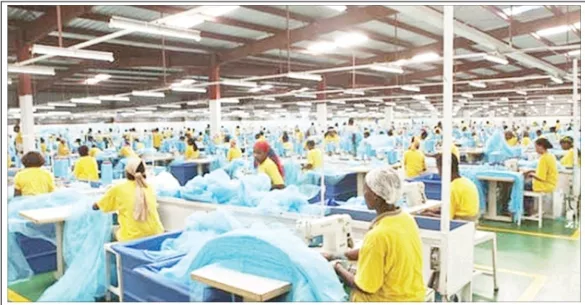Imported goods have witnessed an unprecedented surge in Nigeria’s market, capturing a substantial percentage of consumer demand. Recent data reveals that foreign goods now command an astonishing 80 per cent market share, while locally-manufactured products struggle to maintain their presence. This overwhelming penetration of imported goods is exerting immense pressure on Nigerian manufacturers, hindering their growth and posing a threat to their survival.
The influx of imported goods has resulted in a severe decline in local manufacturing in Nigeria. National Bureau of Statistics reports indicate a significant drop in manufacturing output, with negative growth rates observed across multiple sectors. Local manufacturers are grappling with the challenge of competing against imported products, which often offer lower prices due to economies of scale and favorable international trade agreements.
Several factors contribute to the flourishing presence of foreign goods in Nigeria. Firstly, the acute shortage of foreign exchange for importing raw materials and machinery has limited the production capacity of local manufacturers. Coupled with high production costs, this shortage hampers their ability to compete with imported alternatives. Additionally, inadequate infrastructure, including power shortages, limited transport networks, and substandard port facilities, impede the efficiency of local manufacturers, giving an edge to imported goods.
The dominance of imported goods has significant implications for employment and overall economic growth in Nigeria. With local manufacturers struggling to stay afloat, job losses have become prevalent in the sector. As a result, unemployment rates have soared, and the country’s economic growth potential is stifled. The reliance on imported goods also leads to a drain of foreign exchange, further straining Nigeria’s economic stability.
Director-general of the Manufacturers Association of Nigeria (MAN), Segun Ajayi-Kadir, said the manufacturing sector in Nigeria operates in a harsh economic environment characterised by macroeconomic, regulatory, infrastructure, and poor policy implementation challenges. These challenges have been exacerbated by the lingering effects of the COVID-19 pandemic and the ongoing Russia-Ukraine war, which have negatively impacted credit, energy, agricultural products, and global inputs.
Manufacturers in Nigeria face several obstacles, including an acute shortage of foreign exchange for importing raw materials and machinery, high costs and scarcity of funds, high inflation, multiple taxes and regulations, inadequate power supply and infrastructure, limited and inadequate port facilities, unfavorable monetary and tariff policies, smuggling, counterfeiting, and cloning activities. These challenges continue to persist, leading to a challenging operating environment and a decline in manufacturing indicators.
The manufacturing sector’s output has experienced oscillatory growth patterns, with a decline in performance and negative growth rates. The manufacturing capacity utilisation has remained sub-optimal, further reflecting the difficulties faced by manufacturers.
To address these challenges and promote industrial production, Ajayi-Kadir recommends that the government prioritise forex allocation to manufacturers, unify forex windows, create development funding windows for small and medium-scale enterprises, establish a monitoring and evaluation platform with private sector representatives to oversee the disbursement of development funds, provide credit guarantees for industrial loans, incentivise investment in the electricity value chain, and streamline taxes and levies.
Regarding the power sector, Ajayi-Kadir acknowledged that the energy sector is undergoing an evolutionary process, with the recent constitutional amendment empowering states to generate and distribute power. He emphasised the need to resolve discussions with current players in the energy value chain and ensure a seamless implementation of the new development. The implementation process should foster competition among providers and attract international and local energy equipment producers and companies with financial capabilities to execute power projects efficiently.
The issue of high production costs and the preference for imported goods over local production are major concerns. Ajayi-Kadir acknowledged that Nigeria’s high-cost operating environment with economic inefficiencies makes it cheaper to import certain products than to produce them locally. He highlights the need to improve the operating environment through efficient monetary systems, lower lending rates, favorable forex parity, availability and affordability of infrastructure such as power, and industry-centric policies and regulations.
Access to funds and the high double-digit interest rates are significant challenges for manufacturers. Ajayi-Kadir noted that manufacturers face a dearth of credit and high borrowing costs, which discourage investment. While the Central Bank of Nigeria (CBN) has established development funding windows, their performance and impact on manufacturers have been limited. He called for an expansion of special funding for industrial production and strengthening institutions like the Bank of Industry and Bank of Agriculture to provide liberal finance to the manufacturing sector.
The flooding experienced in 2022 severely affected manufacturers, particularly in states such as Benue, Kogi, and Anambra. The submersion of farm crops and other agricultural produce disrupted the local sourcing of raw materials, resulting in higher costs and inflation. Ajayi-Kadir recommended the development of a contingency plan to mitigate future flooding, including large-scale agricultural production and storage facilities.
Addressing the scarcity of forex and multiple exchange rates is crucial for manufacturers. The shortage of forex leads to lower capacity utilisation and production, while unfavourable exchange rates increase the cost of imported inputs and affect profit margins. Ajayi-Kadir stressed the strategic deployment of available forex and the unification of forex windows to support manufacturers.
The closure of Nigeria’s land borders aimed to curtail smuggling, but it had both positive and negative impacts. While it boosted sales of manufactured goods domestically, it hindered exports and forex earnings. Ajayi-Kadir emphasised the need to strike a balance between curbing smuggling and adhering to the ECOWAS Trade Liberalization Scheme, which promotes a single market for the region.
Rising food and commodity prices in Nigeria are attributed to global and domestic factors, including the Russia-Ukraine war’s impact on global supply chains, energy costs, and insecurity disrupting farm production. Ajayi-Kadir recommended measures such as suspending levies on imported wheat, banning grain exports, and improving security to support local food production.
Samuel Ogbuokiri, a manufacturer in the beverage industry, told NATIONAL ECONOMY that the lack of reliable infrastructure poses a significant obstacle for Nigerian manufacturers today. Power shortages, inadequate road networks, and limited access to ports and airports create challenges in transporting goods and raw materials within and outside the country. As a result, companies face higher costs, longer lead times, and diminished competitiveness.
“In addition to infrastructure issues, there is a shortage of skilled labor in the manufacturing sector. Many manufacturers struggle to find workers with the necessary technical expertise. This problem is partly attributed to the poor state of the country’s education system, which fails to equip young people with the skills needed for success in the modern workplace. Consequently, manufacturers often have to rely on costly expatriate labor, further increasing their expenses,” Ogbuokiri said.
Richard Azosiwe, an economist at Cashlinks, said rising taxes and levies have also burdened the manufacturing industry, along with other sectors. He said over the past decade, Value Added Tax (VAT), excise duty, utility tariffs, and petrol prices have all experienced significant increases. Adding to this, he said the recent introduction of the new Fiscal Policy Measures (FPM) for 2023 does not help matters.
“The sudden increment in excise duty rates is perplexing. It raises questions about the government’s intentions and its potential impact on the brewing sector and overall unemployment rates. The manufacturing sector is already struggling, and tax increases should not be the primary focus at this time.
“Moreover, Nigerian manufacturers face fierce competition from cheaper imports, especially from Asia. This intensifies the pressure on local producers to maintain low prices despite grappling with high costs and limited resources. It presents a concerning situation for the industry,” he said.
Samuel Omotoso, an economic affairs analyst, said, “To address these challenges, the Nigerian government must prioritise infrastructure development, including power generation, road networks, and port and airport facilities. Efforts should also be directed toward improving the education system to provide the necessary skills to the workforce. Additionally, the government should consider implementing measures that support local producers, such as providing incentives and reducing the tax burden on manufacturers.
“Creating an enabling business environment and implementing policies that foster competitiveness and growth in the manufacturing sector is crucial for Nigeria’s economic development. By addressing these obstacles and providing the necessary support, the government can help Nigerian manufacturers thrive, create jobs, and contribute to the country’s overall economic prosperity,” he stated.
As voices from different sectors of the economy reflect, the dominance of imported goods in Nigeria has put local manufacturers in a challenging position. The high percentage of market share held by foreign goods, estimated at around 80 per cent, signifies a significant threat to the growth and competitiveness of Nigerian manufacturers. Urgent measures must be taken to address the barriers faced by local manufacturers, including improving infrastructure, enhancing access to funds, reducing tax burdens, and implementing policies that support the growth of domestic industries. By doing so, Nigeria can nurture a sustainable manufacturing sector, promote job creation, and ensure long-term economic prosperity.
Collectively the analysts agreed that to reverse the overwhelming dominance of imported goods, comprehensive measures must be implemented. The Nigerian government should prioritise the revitalisation of local manufacturing through targeted policies and initiatives. These may include providing financial incentives to local manufacturers, improving access to affordable financing, investing in critical infrastructure such as power generation and transportation networks, and streamlining regulatory processes to enhance the ease of doing business.
Furthermore, there is a need to promote consumer awareness and support for locally-manufactured products through effective marketing campaigns and quality assurance measures. Encouraging partnerships between local manufacturers and international companies can also facilitate knowledge transfer and technology sharing, enhancing the competitiveness of Nigerian products in both local and international markets.
The dominance of imported goods at the expense of locally-manufactured products presents a critical challenge for Nigeria’s manufacturing sector. The alarming percentage of market share held by foreign goods undermines the growth and competitiveness of local manufacturers, leading to job losses and impeding overall economic development. By implementing strategic measures to support local manufacturing, Nigeria can reclaim its position as a vibrant and self-sustaining industrial nation, fostering economic growth, job creation, and long-term prosperity for its citizens.





